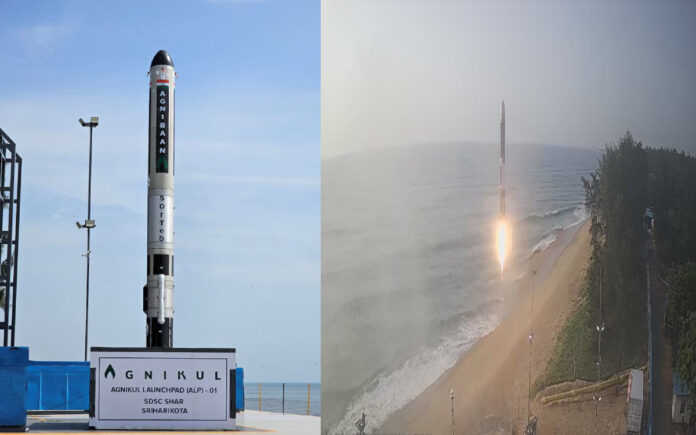Bengaluru: India’s Agnikul Cosmos marked a historic milestone on Thursday with the successful launch of its Agnibaan rocket. Powered by the only Indian rocket engine to utilize both gas and liquid fuel, this marked the country’s second flight of a privately built rocket.
The journey to this triumph wasn’t without its challenges. The Agnibaan’s inaugural flight had faced postponements four times in the past two months due to technical glitches. The most recent setback occurred just days ago on Tuesday, when the launch had to be aborted a mere five seconds before lift-off.
However, perseverance paid off as on Thursday, the customisable, two-stage launch vehicle, designed to carry a payload of up to 300 kg (661 lb) into an orbit approximately 700 kilometers above the earth, soared for two minutes. It reached a maximum altitude, or apogee, of 8,076 meters before gracefully splashing down into the ocean.
In a statement, the company expressed satisfaction with the mission, confirming, “All the mission objectives of this controlled vertical ascent flight were met and performance was nominal.”
India’s PM Narendra Modi also praised this remarkable achievement through a post on X. He mentioned the Agnibaan rocket, powered by the world’s first single-piece 3D-printed semi-cryogenic engine.
India’s space agency, the Indian Space Research Organisation (ISRO), also lauded the achievement. They highlighted that this marked the first successful flight of a rocket equipped with a “semi-cryogenic” engine, a significant step forward. “A major milestone, as the first-ever controlled flight of a semi-cryogenic liquid engine realized through additive manufacturing,” ISRO stated on social media.
Also Read | India’s Monsoon Rains Arrive Early, Boosting Prospects for Agricultural and Economic Growth
The primary aim of Thursday’s suborbital flight was to test the new engine and 3D-printed parts, a crucial phase in advancing India’s capabilities in space exploration. Pawan K Goenka, chairman of the space regulator Indian National Space Promotion and Authorisation Centre (IN-SPACe), hailed the event as a “historic moment.” The Indian Space Association (ISpA) echoed this sentiment, emphasizing that the launch would “bolster global confidence” in the country’s private space industry.
Also Read | RBI’s Net Income Soars 141% in FY24 Amid Lower Provisions and Expenditures
Prime Minister Narendra Modi’s vision of privatising and commercialising India’s space sector has been gaining momentum in recent years. The successful launch of India’s first privately developed rocket by the company Skyroot in 2022 set the stage for further advancements.
Agnikul, whose name is derived from the Hindi and Sanskrit word for fire, was founded in 2017. It operates India’s first private launchpad and mission control centre, distinguishing itself in an industry largely dominated by ISRO.



